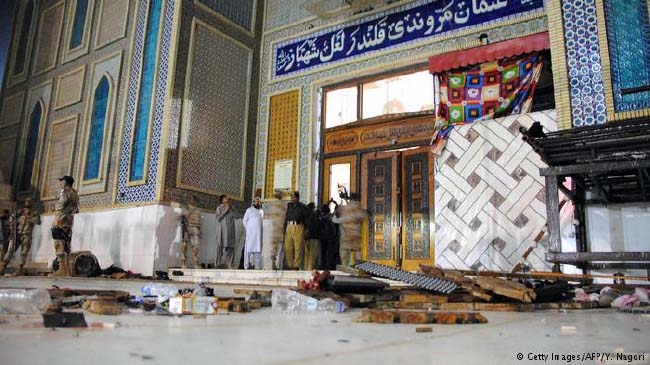Following the Thursday’s suicide bombing in the southern Sindh province, which killed and wounded hundreds of people, Pakistani officials lashed out at Afghanistan stating that the militants organized the attacks from across the border. Warring factions, including the self-proclaimed Islamic State of Iraq and the Levant (ISIL), carry out deadly attacks against Afghan-Pak nations. The individuals suffer severely on the basis of their color and creed. Afghan people, however, are believed to bear and brunt of militancy within the past two years and militancy is most likely to continue unabated.
The mistrust and tension between Kabul and Islamabad were engendered as a result of the Taliban’s intensified attacks against the National Unity Government (NUG). After the death of Mullah Akhtar Mansour on late May, 2016 in Baluchistan, the Taliban led by Mullah Haibatullah inflicted heavy casualties upon Afghan nation. Believing that the attacks were orchestrated from Pakistan, Afghan officials urged Islamabad to destroy the sanctuaries of the Taliban without dividing them into “bad” and “good” groups.
The relations further tensed following Ashraf Ghani’s tirade against Pakistan and his negative answer to its financial aid at the Heart of Asia Conference in the northern Indian city of Amritsar. Ghani said that Taliban insurgency would not survive a month if it lost its sanctuary in neighboring Pakistan, urging it to take on militant groups on its soil instead of giving Kabul financial aid. At a NATO summit in Warsaw, he also pointed out regarding Islamabad that its “dangerous distinction between good and bad terrorists is being maintained in practice”.
It goes without saying that the founder of al-Qaeda, Osama bin Laden, was killed in Abbottabad, Pakistan, on May 2, 2011 and report released that Mullah Omar passed away in 2013 in the Pakistani city of Karachi. In the meantime, Afghan officials said that the Taliban fighters are treated in Pakistani hospitals after being wounded in battles.
To one’s surprise, Pakistan’s Army Chief General Qamar Javed Bajwa called US General John Nicholson, commander of Resolute Support Mission in Afghanistan, and said that continued acts of terrorism in Pakistan from Afghanistan are testing the current policy of cross border restraint. General Bajwa said most of the incidents of terrorism in Pakistan are claimed by terrorist organizations with their leadership hiding in Afghanistan.
Lashing out at Afghanistan, which is the main victim of terrorism, is very ridiculous and irrational. Perhaps, it is done with a view to redirecting the world’s attention towards Afghanistan or simply vents her anger at this country. Needless to say, Afghan soldiers paid high sacrifices in combating terrorism and also inflicted heavy casualties on militant fighters. Condemning the recent terrorist attacks in Lal Shahbaz Qalandar, Ghani said that Afghan government had proved its honesty and commitment in fight against terrorism and add, “Honesty and the will to fight against terrorism will prevent terrorists from carrying out their subversive activities in any country”.
However, Islamabad’s right decision is its military attack on terrorist hideouts. The Pakistani army reportedly attacked the alleged training camp of Jamaat-ul-Ahrar located near the Pak-Afghan border in areas adjacent to Mohmand and Khyber Agency and destroyed the compound and four other hideouts of suspected terrorists. It would be better if this operation had been carried out before the Sehwan incident. In other words, Pakistan will have to adopt offensive strategy rather than defensive one.
Terrorism is a regional and global issue which has involved the entire world. From the declaration of the caliphate until early 2016, some 90 terrorist attacks were either carried out or inspired by ISIL in 21 countries around the globe, from California to Sydney, with an estimated 1,400 victims killed. The responsibility for the February 14 attack in Sehwan was also claimed by the ISIL group which has changed into a highly serious threat in Afghanistan and Pakistan.
Terrorist networks, which operate both in Afghanistan and Pakistan, should not be able to compound tension between the two countries. The blame game and harsh rhetoric will only widen the gap. The formation of ISIL-K close to Afghan-Pak border is a serious threat and loyalists to ISIL group carry out sporadic attack against both Kabul and Islamabad governments. This group played highly destructive role in Afghanistan last year and beheaded the ethnic minority group on the grounds of their creed and color.
To put it succinctly, the ISIL group gained firm foothold in both the countries. It is an undisputable fact that many warring factions operate in Pakistan and the most prominent groups are Lashkar-e-Jhangvi, Jamaat-ul-Ahrar and Tehreek-e-Taliban Pakistan which have carried out recent killings in Pakistan. To eradicate terrorism, Islamabad will have to find out and abolish their headquarters.
Moreover, the seminaries are potential threat to Pakistan and many militants are believed to be trained and organize attacks there.
So, there are some seminaries, in Pakistan, which spread radicalism through poisoning the minds of the teenagers, who come from poor families.
Home » Opinion » Will The Blame Game Mitigate Challenges?
Will The Blame Game Mitigate Challenges?
| Hujjatullah Zia

